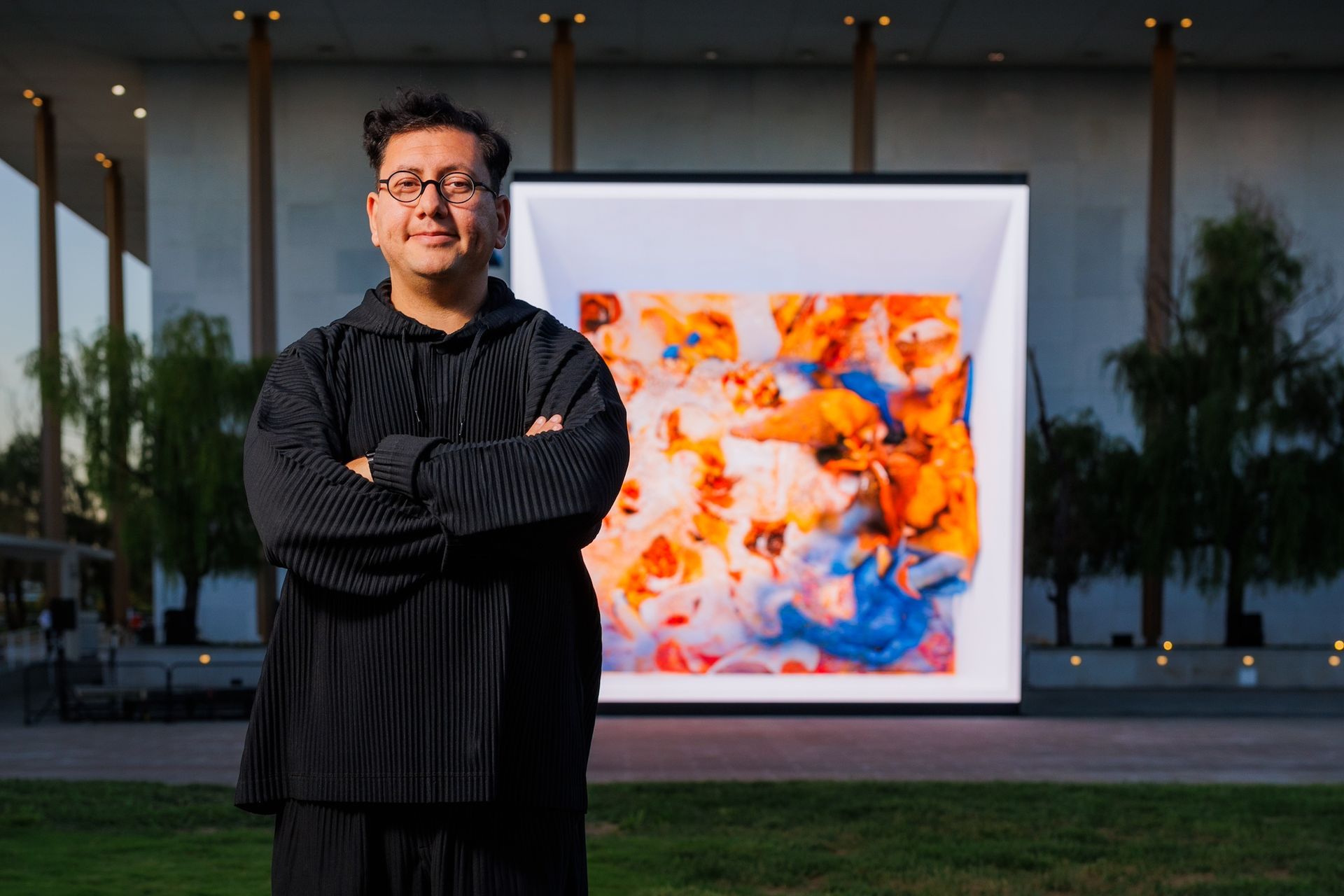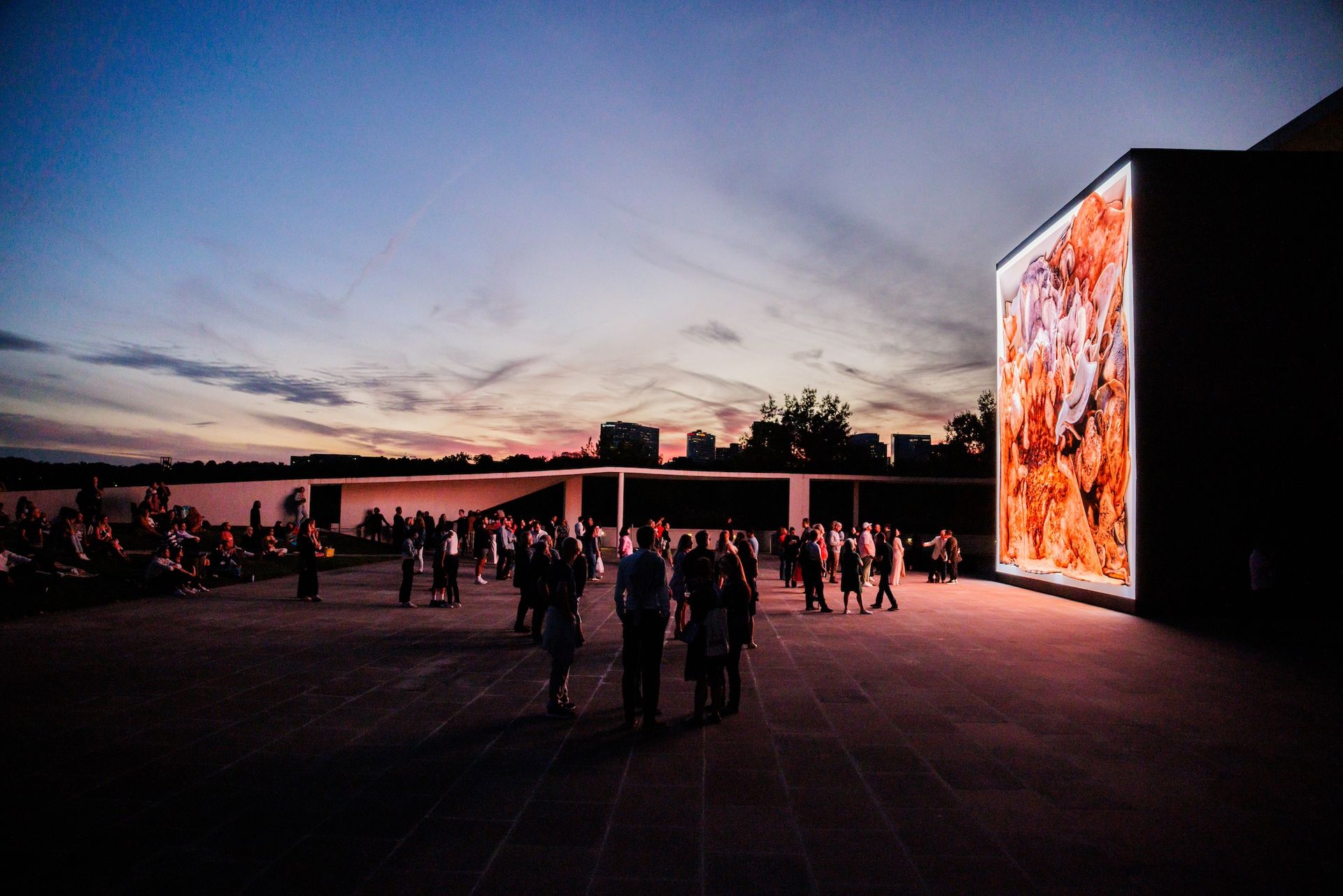Installed in Prague last September, Refik Anadol’s “data painting” paying homage to Antonín Dvořák in his birthplace was installed near a sculpture of the Czech composer at the Rudolfinum music hall. In Washington, DC, where Dvořák Dreams (2023) is on view at the Kennedy Center for the Performing Arts (until 24 September), it appears near sculptures of former president John F. Kennedy and, less than half a mile away, Avard Fairbanks’s busts of George Washington on the campus bearing his name.
The work’s installation in the District makes sense, according to Elle Anastasiou, who commissioned Dvořák Dreams and directs the new media art organisation 0xCollection, which is backed by the billionaire Czech lottery and gambling businessman and philanthropist Karel Komárek.
“Dvořák was the first renowned composer to involve African American spirituals and African American culture into a western musical canon, and was an incredible supporter of the African American community and culture,” Anastasiou, who is based in Basel and London, tells The Art Newspaper. “Particularly in Washington, at this time of year, [the work] conveys a message that we would like to share—that art, and music, and both of those things put together, even if you don’t fully understand it and it’s not your native context, it is a place of community and it is a language which is fundamental to driving humanity forward.”
Audiences experience Dvořák Dreams by Refik Anadol, presented by 0xCollection and the Kennedy Center at the Reach Plaza Photo: elman studio. Courtesy of 0xCollection and The Kennedy Center
The installation reflects “a very American legacy that reflects values that, upon coming to America, are espoused about this country being founded on immigrants and on the excellence of people from all walks of life and on opportunity and that being the basis of American exceptionalism”, Anastasiou says, “whether or not one can claim those are factually true in today’s day and age”.
The installation is a curated, pre-recorded projection of imagery and sound that plays in a 60-minute loop on a 32ft square screen on the side of a cube in a courtyard beside the Washington performance centre. Depending on the day, the piece runs either from noon or 4pm until midnight. In coordination with music, dizzying waves of colour dissolve and come back together, as if seen from above in a box. At various points, representational imagery—whether a cityscape, the Statue of Liberty or Dvořák composing—fade in and out of view, at times as if seen through a rain-covered or cloudy window.
The public display has drawn picnickers in lawn chairs who have come to see Dvořák Dreams in its US premiere, which began last week. The California-based artist tells The Art Newspaper that one way that he measures the work’s impact is that he has already received three emails from students asking if he would discuss their artificial intelligence (AI) and art theses with them.

Refik Anadol with his work Dvořák Dreams, presented by 0xCollection and the Kennedy Center at the Reach Plaza Photo: elman studio. Courtesy of 0xCollection and The Kennedy Center
“In his hometown, when we unveiled the project for the first time, it was very emotional,” Anadol says of the work’s debut in Prague, where he says Dvořák is a hero. “What I felt in the Kennedy Center—now it became a form of art. Now it became like his other works that travel around the world.”
Anadol and his studio of neuroscientists and AI coders have taken pains to focus the sound to create an “immersive experience” at the Kennedy Center, but the artist says he appreciates the background noise, as airplanes fly to and from Ronald Reagan Washington National Airport over the adjacent Potomac River, and the nation’s capital bustles.
“It was loud enough that it was the prime experience. Not the planes. Not the public. But there’s also beauty in hearing the city,” he says. “Cities are probably the most important living organisms that we have that connect society and the culture.”

Audiences experience Dvořák Dreams by Refik Anadol, presented by 0xCollection and the Kennedy Center at the Reach Plaza Photo: elman studio. Courtesy of 0xCollection and The Kennedy Center
Dvořák Dreams is split into four parts representing the musician’s youth in the Austrian empire, his move to New York where he directed the National Conservatory of Music, his return to Europe and his love for composing. Its presentation in the US capital is fitting because “when he came to the United States, his breakthrough happened”, Anadol says.
The artist’s AI “fed” on around 200 works by Dvořák and pored over his notes and art to compose a new piece in the musician’s style. Anadol has done the same for other luminaries, including a projection on Antoni Gaudí’s Casa Batlló in Barcelona, which drew around 65,000 people in May 2023, a work about the poet Rumi in Istanbul in June 2022 and works on Zaha Hadid and Mozart.
“For me it’s an ongoing series,” he said. “What I am advising is we will need independent AIs for each genius or for topics. It is a way of respecting data and respecting the person who left a legacy behind for humanity.”
Refik Anadol: Dvořák Dreams, until 24 September, Reach Plaza, Kennedy Center for the Performing Arts, Washington, DC




















